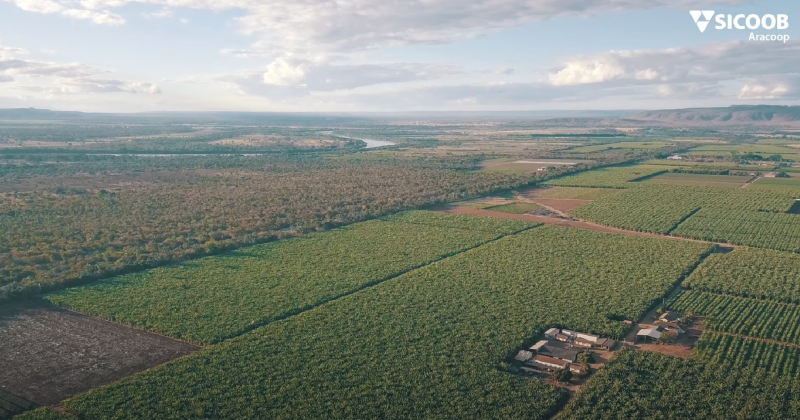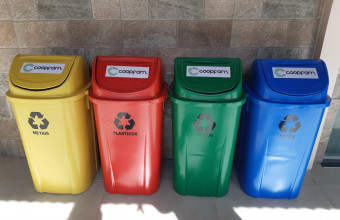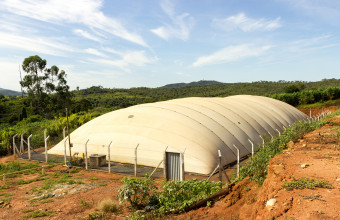With operations in the Brazilian states of Minas Gerais and Pará, Sicoob Aracoop has over 67,000 members and approximately US$654 million in assets. In its product portfolio, this credit union has credit lines aimed at environmental protection and sustainable development of communities, bridging the gap between development and environmental preservation.
One of the highlights of this work is the funding for the construction of the Photovoltaic Power Plant of the Association of Users of the Pirapora Project (AUPPI, for its acronym in Portuguese), in Minas Gerais, with an investment of over US$654,000.
Situated in an important fruit cultivation hub in Brazil, AUPPI is responsible for water collection and distribution in the areas used by its members, as well as maintaining the irrigation infrastructure. The total area encompasses 730 hectares of bananas, 137 hectares of grapes, 116 hectares of oranges, 48 hectares of tangerines, 18.8 hectares of mahogany, and 46 hectares of other crops. All irrigation in these areas is powered by clean energy.
Projects in line with cooperative principles
The funding of the AUPPI Photovoltaic Power Plant is, to date, the largest sustainability project financed by Sicoob Aracoop. The project began in 2019, following the decision to install a photovoltaic plant to generate electricity, with the aim to reduce costs for producers and to use a clean energy source.
“AUPPI was looking for a project that addressed the cost reduction needs of its members and also had a commitment to the environment. Through the enduring relationship between AUPPI and Sicoob Aracoop, and according to the principle of supporting projects aligned with sustainability and the economic growth of the region, Sicoob Aracoop immediately met the project’s demands,” recalls Euder Freitas, regional business manager at Sicoob Aracoop.
The plant was inaugurated in the first half of 2020. Currently, AUPPI is the fifth-largest employer in the city of Pirapora, Minas Gerais, generating approximately 1,000 direct jobs and over 2,000 during the harvest season.
In general, the total volume of projects that benefit from the cooperative’s sustainable credit lines takes a significant share from Sicoob Aracoop’s business portfolio. Another example is the sustainable development project in the third-largest tilapia production hub in Brazil, located in the city of Morada Nova de Minas.
This project led by Sicoob Aracoop benefits the entire production chain of the tilapia business. Furthermore, it has been achieving good results in preserving water quality in one of the state’s most important river basins.
“In addition to these initiatives, we created a special unit focused on social investments. Thus, we centralize and optimize support for socio-environmental development initiatives aligned with the UN’s 2030 agenda and ESG principles in the communities where we operate,” explains Jeferson Humberto dos Santos, cooperative development analyst at Sicoob Aracoop’s Social Investment Unit.
Financing lines for sustainable projects
Sicoob Aracoop has an Internal Socio-Environmental Responsibility Policy that guides the cooperative’s socio-environmental actions and contributes for a cooperativism aligned with sustainable development.
Therefore, each project undergoes a rigorous analysis regarding the social and environmental aspects, along with an internal evaluation methodology that identifies, diagnoses, manages, and monitors the socio-environmental risk of the project, observing the principles of relevance and proportionality.
Sicoob Aracoop’s commercial conditions cover:
- Specific lines for the modernization of structures to make them more efficient, less polluting, and more profitable;
- Social lines that support business regularization for small entrepreneurs, contributing directly to socio-economic development;
- Lines aimed at investments in clean energy sources, such as financing for photovoltaic panels to generate electricity;
- Support in all rural credit operations with periodic inspections to ensure compliance with socio-environmental risk.
“The search for solutions with lower environmental impact and reduced carbon emission is increasing. As Sicoob Aracoop is a reference for sustainable financing and support for socio-environmental initiatives, we can confirm, in terms of business volume, a growing scale in credit releases for the modernization of production structures or exploration of renewable energy sources,” Euder Freitas adds.
Finally, the cooperative informs that it is finishing the construction of its own photovoltaic plant, which will cover the energy consumption of all of the cooperative’s operations, and the excess generation from the plant will be donated to charitable homes in the Triângulo Mineiro region.





